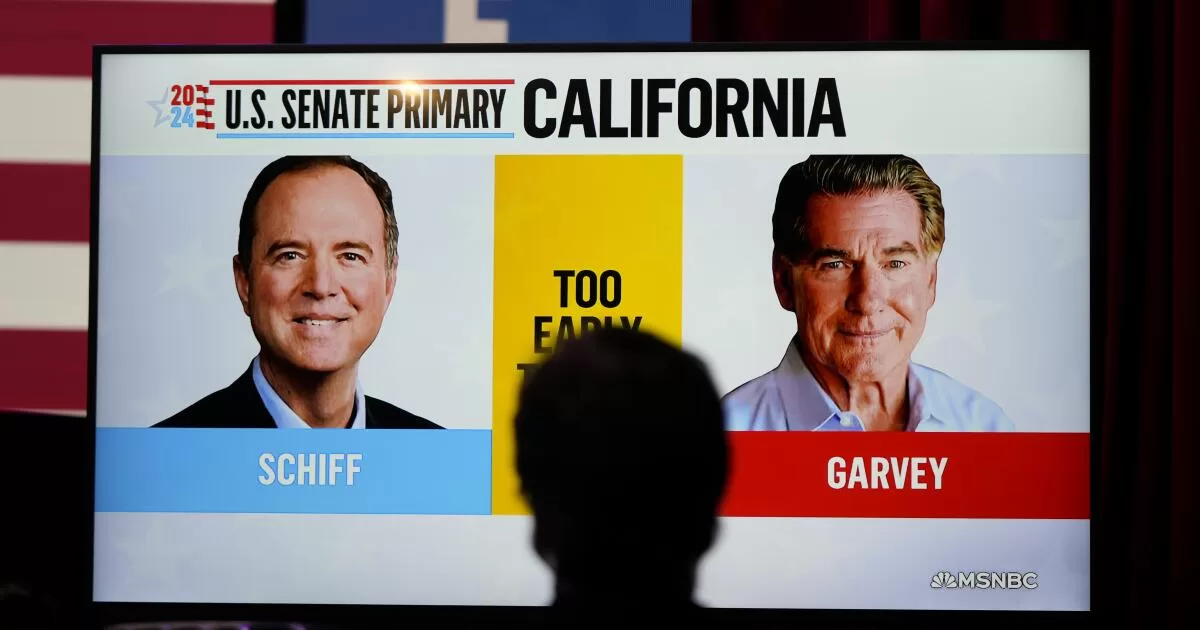The Burbank Democrat may have dug some potholes in the high road he normally travels.
There may be tarnish on the Mr. Clean image.
Not that it will substantially affect how many votes he’ll win in November or future elections. Voters are pretty cynical themselves and aren’t shocked when politicians veer to the low road for expediency.
People are trapped in polarization these days and vote for the candidate of their party, regardless of any character flaws — Donald Trump‘s followers being the sorriest example.
So what was the risk? Probably little in the short run. But some voters may no longer look up to the veteran congressman as a courageous idealist.
Certainly many young supporters of Democratic Rep. Katie Porter of Irvine, the potential November rival Schiff feared most, are ticked off at his tactics and are likely to long remember.
In any case, Schiff’s ploy was somewhat disappointing and may not have been necessary.
Former Los Angeles Dodgers and San Diego Padres star Steve Garvey — the race’s only recognizable Republican — may have advanced to the November runoff on his own without being propelled by Schiff, who handpicked his preferred weak opponent for November.
But if Schiff’s push was indeed necessary for Garvey to finish among the top two vote-getters and qualify for the November runoff, then it’s another example of the California GOP’s pathetic weakness. Think of it: A Republican candidate needs the backdoor help of a Democrat to reach the November finals in a major statewide race.
In his election night speech, Garvey should have thanked Schiff. He did not. But he cautioned him.
“Know this: It ain’t over till it’s over,” Garvey said, quoting the late Yankee catcher Yogi Berra. “It’s true in baseball and it’s true in politics.
“And my opponent has been advertising that he wants me. He’s mistaking kindness for weakness. I would suggest that he keep in mind that old saying: Be careful what you ask for.”
No, Steve, there’s no mistaking the weakness of the California GOP. Numbers are determinative in baseball and politics. No Republican has won a statewide race in California since 2006, and GOP voters are outnumbered nearly 2 to 1 by Democrats.
In early vote counting from Tuesday’s primary, support for the three major Democratic candidates exceeded that for the top three Republicans by 20 percentage points. And it was an extraordinarily low voter turnout that helped the GOP. That landslide-size spread is a good predictor of the November outcome.
To back up, Schiff’s aim was to help Garvey beat out Porter for one of two qualifying spots in the general election. As I previously wrote, what Schiff did was savvy but stinky.
Schiff’s TV ads ostensibly attacked Garvey for being a two-time Trump voter who could swing the Senate to GOP control. The ads also falsely implied that Republican Garvey — not Democrat Porter — was Schiff’s principal primary opponent. That disingenuous message was aimed at Democrats.
But the TV spots’ No. 1 goal was to promote Garvey’s conservative bona fides among Republican voters. Garvey couldn’t afford to promote himself. He didn’t spend a dime on TV. So, Schiff did it for him.
In fact, Garvey hardly did any campaigning at all. He survived off Schiff ads, name identification and the GOP brand that attracted Republican voters.
Actually, Garvey ducked answering whom he’ll vote for in the presidential election, although he did acknowledge casting ballots for Trump in 2016 and 2020.
Schiff didn’t invent the strategy of boosting a preferred opponent. It’s time-tested in California.
Example: In the 2018 gubernatorial primary, then-Lt. Gov. Gavin Newsom used the same tactic successfully while running against two high-profile Democrats — former Los Angeles Mayor Antonio Villaraigosa and state Treasurer John Chiang. Newsom’s TV ad promoted unknown Republican John Cox and pushed him into the November runoff. Newsom then trounced Cox by 24 percentage points.
One problem is that this undermines a goal of California’s top-two open primary system, which is to advance the two most qualified and viable candidates — regardless of party — to the November election.
Ironically, Schiff made his congressional bones fighting to preserve and advance American democracy — including investigating alleged Russian interference in Trump’s 2016 presidential election and Trump’s attempt to overturn President Biden’s 2020 victory.
But in this primary election, Schiff undercut democratic ideals.
OK, maybe that’s a little too purist. Idealism is not a standard requirement for campaign combat. All’s fair in love and war and primaries. Blah, blah.
“I think what he did was perfect,” says veteran Democratic strategist David Townsend. “What is the job of a candidate in a political campaign? To win. No. 2, don’t do anything illegal or attack your opponent for something that’s not true.”
Schiff certainly did nothing illegal. But he skirted close to the edge on truth.
“Schiff’s people should be applauded,” Townsend continues. “Brilliant.”
Fine. But I dread the next games-playing, smelly tactic some brilliant politician is bound to concoct.
